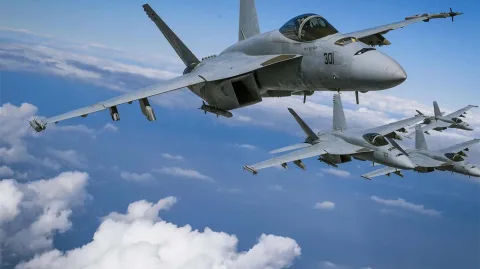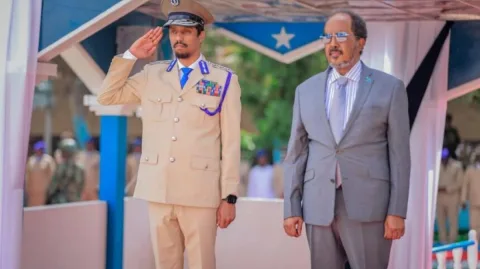Kenya intends to push its troops to Somalia’s insurgent stronghold of Kismayo and will stay until…
![]()
 Kenya intends to push its troops to Somalia’s insurgent stronghold of Kismayo and will stay until there are no Islamist insurgents left, a Kenyan military spokesperson said on Thursday, as the militants were pushed back on two fronts by pro-Somali government forces supported by foreign troops.
Kenya intends to push its troops to Somalia’s insurgent stronghold of Kismayo and will stay until there are no Islamist insurgents left, a Kenyan military spokesperson said on Thursday, as the militants were pushed back on two fronts by pro-Somali government forces supported by foreign troops.
“We are going to be there until the [Somali government] has effectively reduced the capacity of al-Shabaab to fire a single round… We want to ensure there is no al-Shabaab,” Kenyan military spokesperson Emmanuel Chirchir told The Associated Press. “We want to destroy all their weapons.”
He said troops have secured a foothold in Ras Kamboni, a town on a peninsula close to the Kenya-Somalia border, and that al-Shabaab militants left the town before the Kenyans arrived.
“This provides a vantage point for us to clear al-Shabaab and pirates from the Somali coast in Kismayo,” he said. “Al-Shabaab is in disarray.”
His words were the clearest statement yet of Kenya’s intentions after it sent troops into Somalia last weekend. Kenya said it was retaliating for a series of raids by Somali gunmen who have attacked and abducted foreigners from Kenyan territory.
Two Spanish aid workers, a cancer-stricken quadriplegic Frenchwoman and an Englishwoman have all been seized in the past six weeks; the Englishwoman’s husband was killed in the kidnappers’ assault. On Wednesday, the French government announced that the Frenchwoman had died.
A pro-government militia spokesperson confirmed the capture of Ras Kamboni, home to many of the fighters in his militia.
“Our troops and Kenyan soldiers have captured Ras Kamboni from al-Shabaab this morning,” Abdinasir Serar, a senior commander with the pro-government group, told The Associated Press by phone.
Amputations
In the capital, the militia was chased out of the capital’s northernmost neighbourhood, Deynile, in a dawn offensive, residents said. Somali government troops and African Union peacekeepers took control of the area, which the Islamist insurgency used as an execution ground and as an area for carrying out amputations.
“Somali government soldiers and Amisom are here today and Al-Shabaab left,” said resident Liban Abdullahi, using a common acronym to refer to the 9 000-strong African Union force of Burundian and Ugandan soldiers. “We wish quiet days will follow, because we were always in trouble living among two warring sides.”
A police official said government troops had encountered little resistance during their dawn attack.
“We have captured the whole district, and the anti-peace elements have fled to the outskirts,” said Aden Kalmoy, a Somali military spokesperson.
Two years ago, al-Shabaab held almost all of southern Somalia, and the government was confined to a few city blocks.
But the militia has been weakened by a severe drought and famine in its strongholds, a loss of revenue from markets in the capital of Mogadishu, internal divisions and public disgust over their strict punishments, recruitment of child soldiers and indiscriminate bombing. They are also severely out gunned by AU forces.
At the same time, the weak UN-backed Somali government has been strengthened by foreign backers, including military personnel from Burundi, Uganda and Kenya and financial and logistical support from Italy and the US that means that government soldiers have been regularly paid this year for the first time in more than two decades of civil war.
Assassins
The changes forced al-Shabaab to retreat from Mogadishu in August in what its leaders described as a tactical pull-out. In response, the militant group has carried out a campaign of suicide bombings.
Many have detonated prematurely or been intercepted, including two incidents on Wednesday in which government troops captured a man with explosives, said Lt Mohamed Nur. A separate roadside bomb killed a man who was trying to plant it, said police official Ali Hassan.
The most devastating attack so far was a truck bomb that killed more than 100 people earlier this month. Many were students seeking information about scholarships in Turkey. Now many Somalis are trying to avoid public places or take back roads to avoid possible violence.
The two regions of northern Somalia, Puntland and Somaliland, are considered far more stable and have seen less fighting. But Puntland has been targeted by assassins in recent months.
A grenade attack on a Somali radio station is the fifth time journalists in northern Somalia have been attacked in three months, the Committee to Protect Journalists said late on Wednesday.
Tuesday’s attack on Radio Galkayo is the third time a grenade has been thrown into a radio station in the semi-autonomous region of Puntland in as many months. No one was hurt in the attack although a wall was destroyed. Two journalists were also shot in September in separate attacks.
Radio Galkayo also had a grenade thrown into its office last year and a bomb was found outside Radio Daljir’s gate in May. Puntland authorities say al-Shabaab is behind the attacks.





